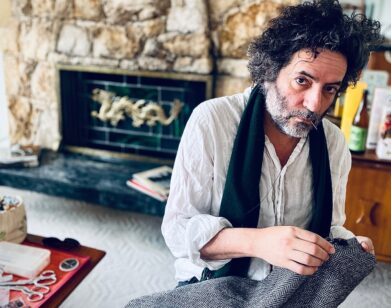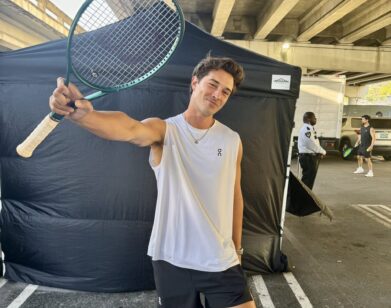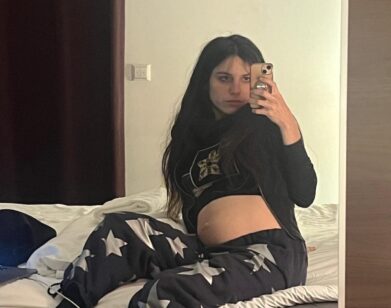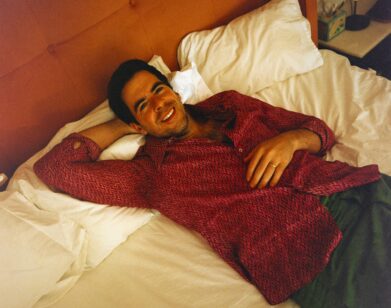A Suckers Salad
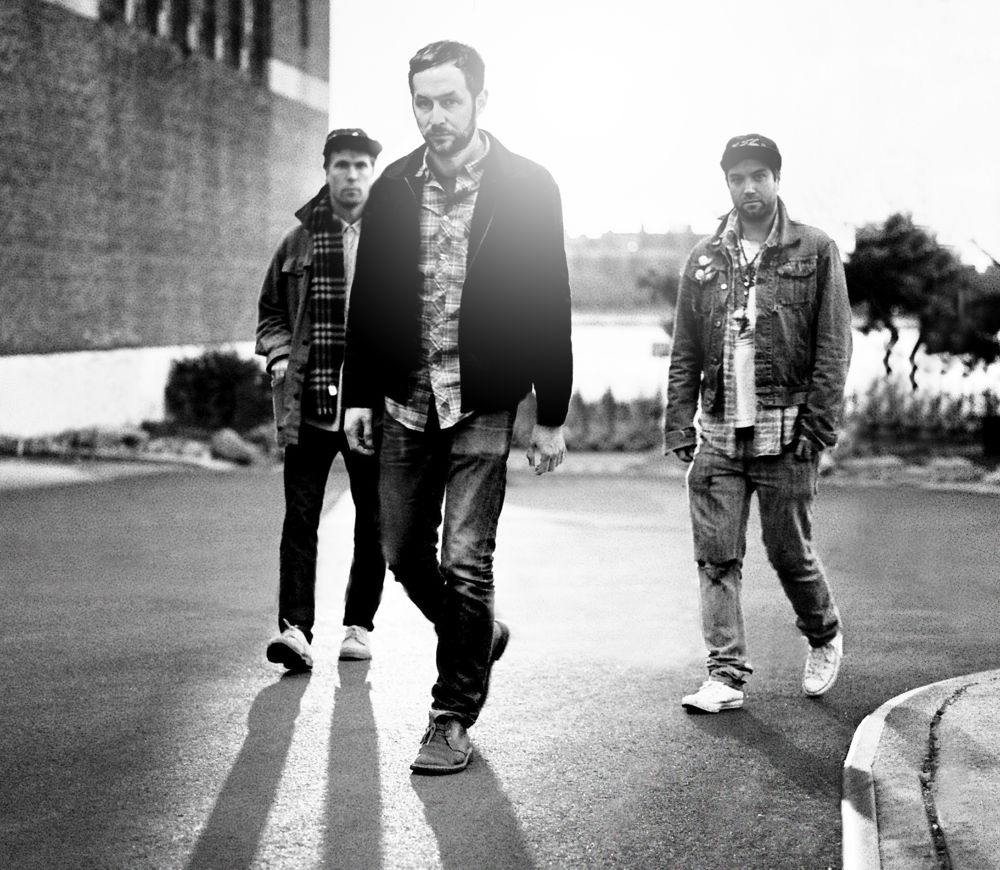
ABOVE: (LEFT TO RIGHT) AUSTIN FISHER, PAN, QUINN WALKER. PHOTO BY CHRISTOPHER GABELLO.
In summer of 2009, Interview featured Suckers as a rising local band, part of the “New New York Noise.” Nearly three years on, and now a three-piece band (member Brian Aiken departed on friendly terms), Suckers is about to release their second full-length LP, Candy Salad. A more cohesive album than their debut, Wild Smile, the first single off of Candy Salad, “Turn on the Sunshine,” is, as the name suggests, a blissful, lackadaisical summer song—the sort that evokes a montage of frolicking in the Brooklyn Botanic Garden. “I think the theme [of the album] is ‘cut all the fat off,’ they are all to the point pop songs,” Pan, the member with no last name, told us. “It’s more mellow, less manic-sounding,” offered Austin Fisher. We decided it was time to check in with our old friends. We met in a bar on the edge of Williamsburg to talk candy salads, Jack Johnson, and odd concert experiences.
EMMA BROWN: So, how did the three of you meet? I know that you are cousins, Austin and Quinn, but how did you meet Pan?
PAN: We’re from Connecticut, 20 minutes away from each other. I met them after high school, just playing music.
QUINN WALKER: [Austin and I] met each other at the crib.
AUSTIN FISHER: Pan was a little bit late for that.
PAN: I was not in the crib.
FISHER: It just so happened that we moved to New York at the same time. Not as a band, but we were here for a while before we started playing. Quinn and I lived in Brooklyn and we moved into this big loft.
PAN: I lived there for a week.
FISHER: Yeah, you lived there for a week. It was horrible. We quickly realized that we didn’t want to be there long-term, so we never built any rooms in it. We kind of just made like tents—tent-like partitions.
BROWN: Did you make an entire tent, one with a roof?
FISHER: No, I took stainless steel shelving and hung sheets and made a box around my space. Someone else got more creative and found wood and stuff, but there were no ceilings. I’ve been trying to move out of the neighborhood ever since.
BROWN: Do you have a room with walls now?
FISHER: Yeah, I have a room with walls, like a respectable person. My fiancée and I have a cool little place that quickly became surrounded by luxury condos. It’s right up the river, it’s pretty nice.
BROWN: Were you playing with other people when you first moved to New York?
FISHER: Quinn and I were. Pan was going to film school. [Quinn and I had a band but] two of the members quit. One of the guys moved back to Connecticut, and then one of them was a drug addict.
WALKER: He sold the bass amp that I hooked him up with for drug money. He was like, “I guess I’m not in the band anymore,” and we were like, “Yeah, I guess not.”
FISHER: “I guess there’s no band…”
WALKER: This was Pan’s closest friend, and Pan took over for him.
BROWN: Is he all right now?
FISHER: He’s alive. He’s okay.
WALKER: He’s in higher spirits than we’ve seen him in a long time.
PAN: He’s back in San Francisco now. We’ll see him on this next tour. We probably won’t stay with him.
BROWN: Were you called Suckers before?
FISHER: No.
WALKER: We were looking for a simple [band name] that wasn’t forgettable and hadn’t been used before—It’s so difficult to come up with just a one-word name for a band that hasn’t been used.
FISHER: There were no more bands with “the” in the name, there are all those bands before us like The Strokes. Then every band has an animal in their name—Animal Collective, Panda Bear, Wolf Parade, Crystal Antlers. Now there are a lot of “new” or “young” band names. It sort of this weird collective consciousness that happens.
BROWN: Candy Salad is your second full-length album; how has it changed from your first album?
PAN: We wrote all the songs the same way, but we wrote them around the same time. The first album was written over many different periods of time. One [song] was from an EP from before, one of them Quinn had written, one of them Austin had written, one of them we had recorded the year prior and released as a single. Maybe five songs were written at the same time. It was kind of like, “We have to make an album; let’s get as much together as we can, the best songs that we can scrounge up and write at one time and make a record.” This time we wrote the album together, for the purpose of writing songs for an album.
WALKER: We entered the studio this timing knowing exactly the desired effect that we wanted from the songs that we were recording.
BROWN: How do you begin a song?
PAN: We come up with a catchphrase. [laughs]
WALKER: Usually from a cereal. [laughs]
FISHER: We start with the music first, just improvising, and then something catches everybody’s attention and we work on that. We’ll do a jam and record it and then go back over it and find the best moments.
PAN: The melodies and the vocals are improvised around the same time as that.
FISHER: Then we get to the studio and rewrite all the lyrics.
WALKER: There are definitely words that we avoid when writing lyrics, things that don’t fit well. There are a lot of go-to words.
PAN: Like “sunshine.” [laughs]
WALKER: Yeah, words that just really fit well in the songs and if you could replace a word that sounds kind of awkward… I feel like we go more for what sounds familiar and good when it comes to lyrics rather than trying to be poetic and push in [a certain word] intentionally.
BROWN: Do you do any activities together for inspiration when you’re writing music?
PAN: Show up to rehearsal.
FISHER: “Showing up is 90 percent…”
BROWN: I know you’re about to go on tour; are there any cities or venues where the crowd is particularly tough to please?
PAN: Tough, or non-existent? [laughs]
FISHER: Salt Lake City is usually a harder spot.
PAN: But the kids are really into it.
WALKER: It’s unique because a lot of families come out, the kids and their parents.
PAN: It’s this all-ages venue and you can’t bring any booze or stuff like that, they say they’ll shut down the club if they find alcohol on the premises. The promoters will generally go get us a six-pack—Polygamous Pilsner—then we’ll sit in our van and drink beer. [laughs] Not while we’re driving, in the parking lot.
FISHER: We went out afterwards and it was like walking into a really low-budget version of that movie Hackers. [laughs] A weird mid-’90s time warp, everyone was in baggy UFO pants and speed goggles.
WALKER: It was like a rave that not many people showed up to.
PAN: A failed rave.
WALKER: We were pretty fascinated by the hula-hoopers who were doing handsprings and somersaults while still hula-hooping.
BROWN: People were hula-hooping? Why?
WALKER: It was part of the rave.
BROWN: What’s the biggest show you’ve ever played?
PAN: We played with Passion Pit at Governors Island; there were probably 8,000 people there.
FISHER: We’ve played with MGMT. Their second show, I think they opened for us, and then when they got big we opened for them [laughs] I think the funniest [concert]—we played at Austin City Limits Festival and it was really nice, we were driven around in golf carts. Then the next day we had to drive to Oklahoma City and play a show. We pulled up to the club and it looked like we had pulled up to a building that had burnt down, but it hadn’t, it was just the club. There was no one there apart from my friend and the guy who thought he was Jesus and was carrying a big cross around on his back. That was probably the smallest show we’ve played.
BROWN: What do you see as the point of your music?
WALKER: It’s something you just have to get out of your system, play it. Music drives people’s emotions more than any other art form, I think. Especially people are invested in it, playing it.
BROWN: Is there a genre of music you just don’t understand: “Why would anyone want to listen to this, it’s horrible,” etc.?
WALKER: Country and rap. That’s what everybody always says, “I like everything but country and rap”—people that listen to Britney Spears. I like every genre of music
FISHER: I think my least favorite is hardcore punk. I think hardcore punk bands all sound the same.
WALKER: One of my favorites! I think my least favorite is Jack Johnson, Bruno Mars, Ben Harper. The acoustic, beach-y bullshit songs.
BROWN: Interview is, obviously, all about interviewing. If you could interview anyone, who would you choose?
PAN: Somebody with a lot of worldly, extensive, insane experience.
WALKER: Music-wise? Probably David Bowie.
BROWN: What would you ask him?
WALKER: “Do you like our music? Do you approve of us?” I dunno. [Maybe] Mitt Romney.
BROWN: I’m not sure he’s really the Interview type, though we did once have an issue with both Jerry Falwell and Hugh Hefner in it, so maybe…
WALKER: I guess I would want to interview someone who I really disrespect and want to bring to light.
BROWN: Jack Johnson?
WALKER: [laughs] “Did you really mean what you said in that Curious George song?” We’ve done something for Interview magazine before, we were dressed in Gap clothes and paraded around Central Park.
FISHER: They set up shoot in Central Park in the northwest corner, but what they hadn’t realized was that they set up a shoot right where all the prostitutes take their johns.
BROWN: What time of day was this?
WALKER: Middle of the day. And there was a guy dressed up like Batman in a garbage bag.
[all laugh]
FISHER: That was a strange day.
CANDY SALAD COMES OUT TOMORROW ON FRENCH KISS.

